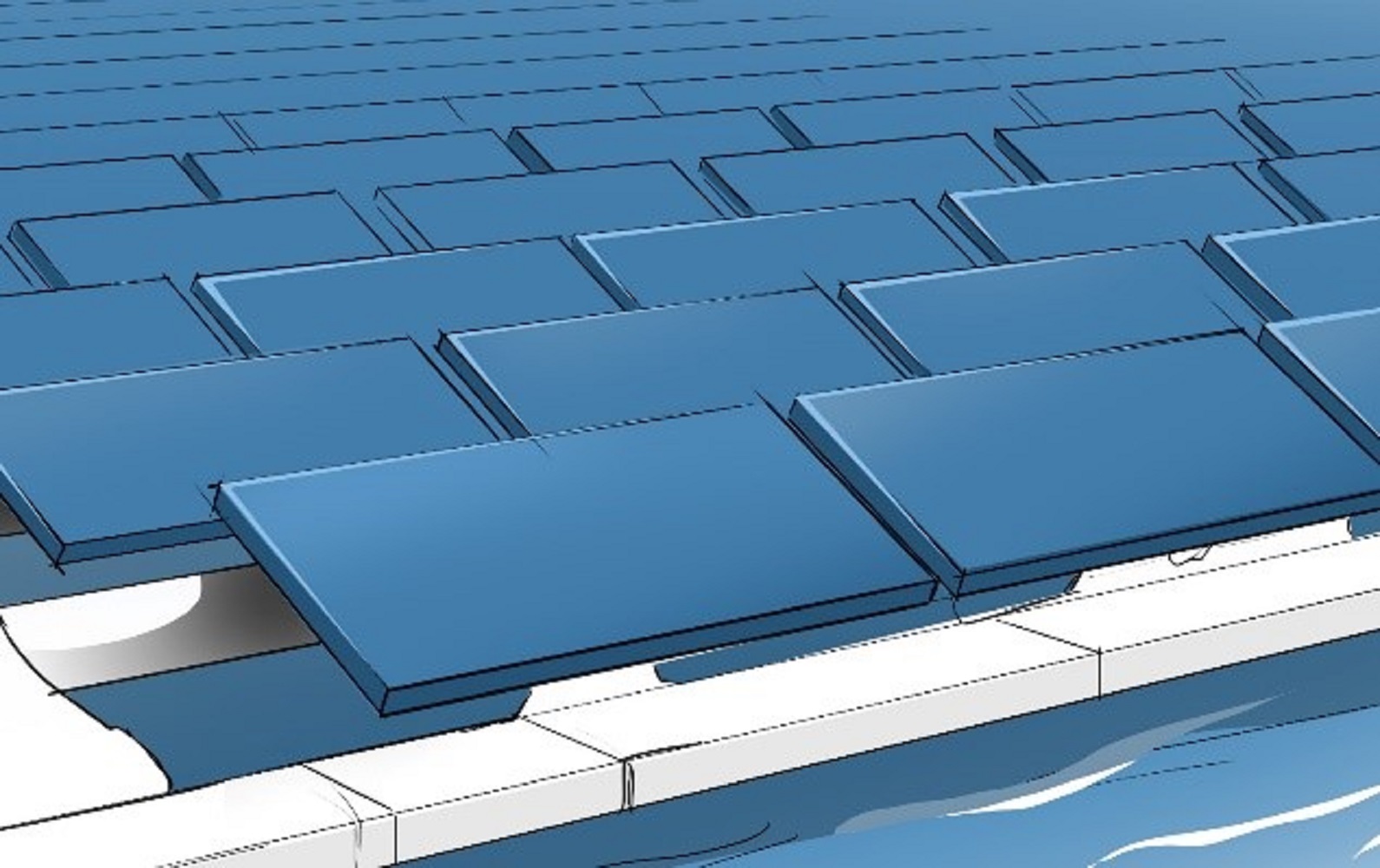Press Release #14
Solar Systems Learn To Swim: Research and Industry Join Forces to Perform Long-Term Tests On Different System Designs
Floating photovoltaic power plants can contribute to the expansion of renewable energy without taking up land. The Fraunhofer Institute for Solar Energy Systems ISE, RWE Renewables and the Brandenburg University of Technology Cottbus-Senftenberg (BTU) are working together to further develop this innovative technology with other partners. In the joint research project PV2Float, the partners are to test several floating PV systems with different structure designs under real conditions over a three-year period. An Evaluation for a suitable open pit lake for the implementation is currently ongoing.

Floating PV systems are installed on open water surfaces. They offer potential for renewable power generation and climate protection, and the technology hasn't been widely adopted yet. In contrast to conventional ground-mounted systems, the PV modules are mounted on floats or membranes, which are put out on bodies of still open water and on the sea. In Germany alone there are about 500 open pit lakes, leftover from lignite open cast mining. According to Fraunhofer ISE, the potential of these open pit lakes from a purely technical standpoint is in the mid double-digit gigawatt range. Thus, floating PV opens up new applications for these former mines in locations such as Lusatia in the east of Germany. The aim of the PV2Float project, funded by the German Federal Ministry for Economic Affairs and Energy, is to develop the potential of this technology. The power plants installed and tested in this project form an important basis for the research work, with which a precise analysis of the technical requirements, economic efficiency and the ecological effects of floating PV power plants in Germany will be carried out. Acceptance of the new technology will also be investigated.
In addition to selecting the location of the site, the project partner RWE will carry out a comprehensive potential analysis of the German and international market for floating PV. As one of the world's leading renewable energy companies, RWE has many years of experience in the construction and operation of ground-mounted PV plants. Currently the company is implementing a floating PV project in the Netherlands. Thorsten Miltkau, Senior Manager Solar Power at RWE renewables explains: “We see great potential for floating PV worldwide. With this research project, we want to deepen our knowledge of the technical possibilities of floating PV systems, such as scalability and energy yield, and transfer the findings to commercial projects.”
The demonstration PV plant is to be designed and built together with Volta Solar. Four floating PV installations and a reference installation on land with a total power of around 150 kilowatts are planned. Heckert Solar, a solar module manufacturer in Chemnitz, will support the project with innovative PV module concepts.
VDE Renewables is evaluating the developed power plant concepts to ensure that they comply with standards and electrical safety. They will also inspect the plants after construction. Fraunhofer ISE will investigate the regulatory framework for floating PV plants and is also developing a procedure for the participation of local stakeholders. Additionally, the institute will perform durability tests on the individual system components, further develop PV modules as well as simulation models on energy yield, adapting them to meet the particular requirements of floating applications, where necessary. The researchers at Fraunhofer ISE will also investigate the economic viability of floating PV. Stefan Wieland, project head at Fraunhofer ISE, says: "Bodies of water put special demands on the design, material, environmental compatibility and operational management of floating PV power plants. In the project, these aspects are investigated for large floating PV plants.” The aquatic ecology monitoring is the responsibility of BTU Cottbus-Senftenberg and the Institut für Wasser und Boden Dr. Uhlmann in Dresden.
Dr. Dieter Leßmann of the Faculty of Water Protection at BTU Cottbus-Senftenberg explains: “The ecological compatibility of floating PV systems is a basic prerequisite for approval and authorization. In the research project PV2Float, we will deepen our knowledge on the ecological effects that these systems may have on bodies of water.”
Project partners
RWE Renewables is one of the world's leading renewable energy companies. With around 3,500 employees, the company has onshore and offshore wind farms, photovoltaic plants and battery storage facilities with a combined capacity of approximately 9 gigawatts. RWE Renewables is driving the expansion of renewable energy in more than 20 countries on five continents. From 2020 to 2022, RWE Renewables targets to invest €5 billion net in renewable energy and to grow its renewables portfolio to 13 gigawatts of net capacity. Beyond this, the company plans to further grow in wind and solar power. The focus is on the Americas, the core markets in Europe and the Asia-Pacific region.
BTU Cottbus-Senftenberg is a young university with a strong focus on innovation and sustainability. The combination of basic and applied research leads to solutions that are needed worldwide in the areas of the environment, energy, materials, buildings, health as well as in the information and communications technology ICT. BTU sees itself as part of the international scientific community: One third of the approximately 7,000 students come from over one hundred countries. Our students value the well-founded and challenging education just as much as the international and familiar atmosphere on campus.
*Further Information
Wirth H, Eggers J-B, Trommsdorff M, Neuhaus H, Heinrich M, Wieland S, Schill C. Potenziale der Integrierten Photovoltaik in Deutschland. Tagungsband 36. PV-Symposium, ISBN 978-3-948176-14-3, 2021 – Publication will be provided to interested parties by Fraunhofer ISE
Last modified: